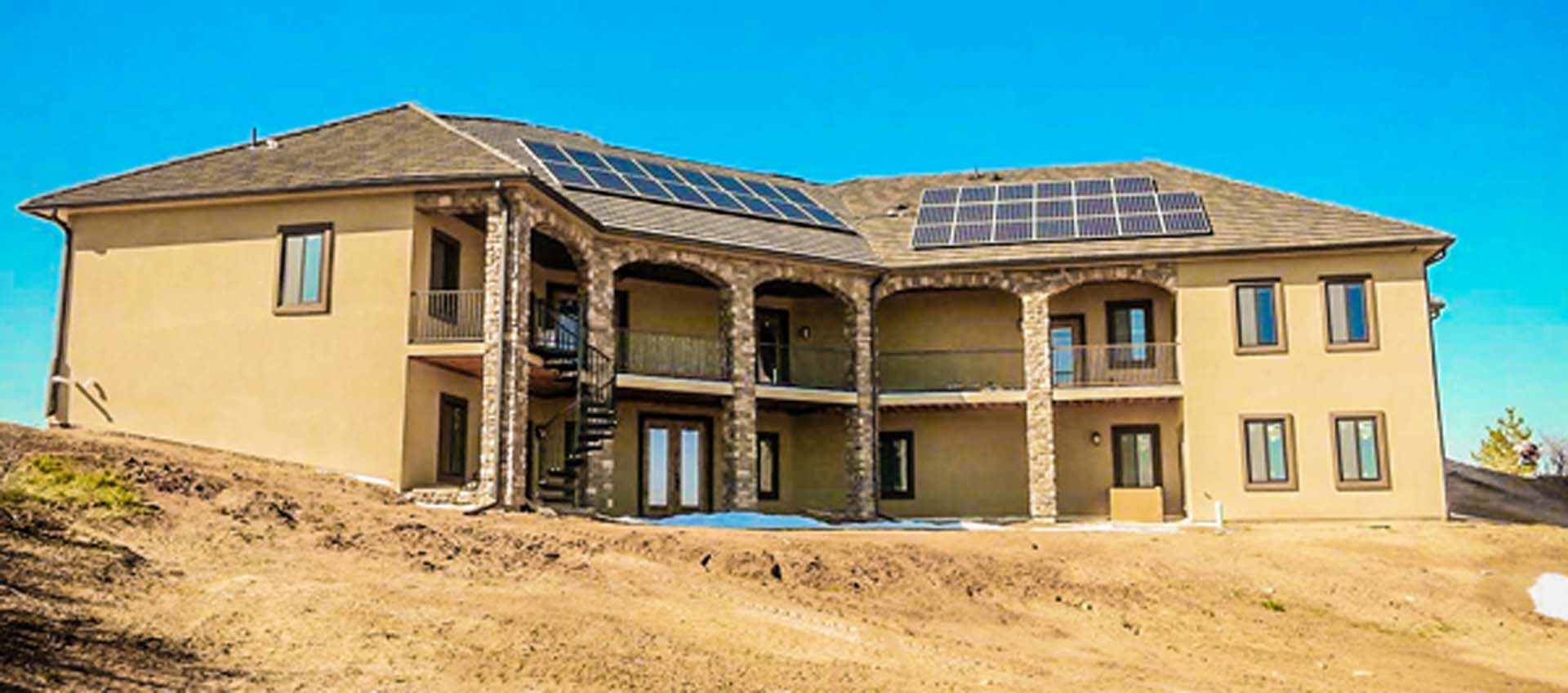No Air Conditioning? No Problem! Couple Builds ICF Home in Colorado.
After one summer in our ICF house, we decided we didn’t need air conditioning.
When Mike and Laura Braunschmidt started thinking about building a new home, a common theme was agreed upon: extreme energy efficiency.
“Originally we were going to downsize. It’s just my wife and I so we don’t need that much space,” said Mike. But when the perfect two and a half acres came available in Littleton, Colorado in a neighborhood that required homes to be 6,000 square feet or more, the decision was made to build a beautiful 7,000 square foot ranch style house. After a little research, they decided that the easiest and most efficient building method was ICFs. More research led them to BuildBlock.
The Braunschmidt house is a great example of how easy it can be for first time home builders to build simple or complex structures with ICFs and produce exceptional results. They did 90% of the project on their own despite the fact that they are not professional builders and, before this project, had very limited construction experience.
They used ICFs for all of the exterior walls. The basement is all BuildBlock ICF as well. Although their soil tests came back with positive results, some neighbors had reported bentonite in the area so the Braunschmidt’s decided to play it safe. To avoid expensive pylons they chose to install an elevated crawl space with BuildBlock’s ICF decking system, BuildDeck.
From top to bottom, the Braunschmidt’s made energy efficiency a priority. In addition to the ICFs, they installed LED lights throughout the house and solar panels on the roof.
“The panels produce 1150kwh per month, which is more than we need but we’re looking to purchase an electric car in the future so we planned ahead.”
Efficiency was a key element in the beginning design phases as well. The roof was designed to partially hang over the large wrap around deck to reduce solar gain in the summer and increase it in the winter. The pitched roof is composed of concrete tile and the attic is insulated inside with 20-24 inches of blown-in cellulose insulation.
When completing the project, Mike and Laura decided to forgo the installation of an air conditioning system and stay in the home for one summer just to see if it was necessary. Even on several successive hot, 93 degree days in Colorado, the temperature inside stayed steady at 72 degrees. Throughout the summer, visitors would continually comment on how cool and comfortable the house is.
At the end of the summer, they decided that installing an air conditioning system would be unnecessary. “We saved around $20,000 by skipping the AC”, Mike said, “It’s not just the unit itself but also the ductwork, electrical wiring, etc.”
Utility bills for similarly sized houses in the area can range from $300-$500 a month. The Braunschmidt’s, on the other hand, paid around $10 a month in electricity costs during the summer. And while their gas bill will increase slightly in the winter, their average utility cost should remain well under $100 per month year-round. These monthly savings have lead Mike to estimate that the ICFs will pay for themselves in less than seven years, not to mention the fact that the overall cost of this project (without air conditioning) is the same if not a little less than a house built with traditional wood framing, insulation, and air conditioning.
The concrete theme continues inside the home. All of the countertops are concrete and several of the sinks in the house are custom made out of concrete as well. The home boasts many different ceiling heights, beautiful stone arches throughout, and a large three-car garage with plenty of extra space. The final (and possibly most impressive) feature is the large wrap-around balcony in the back of the house. The home sits on a hill and the view from the back patio is impressive. The house is designed so that every bedroom has access to the balcony and it provides the perfect space to sit and enjoy the beautiful Colorado sunset.
Related Posts
Construction Starts for the First Home of Nicor Gas’ “Smart Neighborhood” Using BuildBlock ICFs
Aurora, IL, July 10, 2025— Kicking off a groundbreaking step toward sustainable housing, Nicor Gas and Habitat for Humanity have officially begun construction on Habitat Green Freedom—an ambitious initiative utilizing BuildBlock Insulating Concrete Forms (ICF) to build disaster-resilient, net-zero homes that redefine affordable living.The first house project is located at…
Insulating Concrete Forms (ICFs) for Commercial Construction: Fast, Efficient, & Cost-Effective
Insulating Concrete Forms (ICFs) deliver energy efficiency, disaster resilience, and cost-effectiveness all in one material, and the Sherwin-Williams retail store in Oklahoma City stands as a testament. Constructed using BuildBlock ICFs, this 4,400-square-foot facility exemplifies the advantages that ICFs offer for commercial projects.
New Orleans Area Habitat for Humanity ICF Project, November 2023
In November, BuildBlock sponsored and led a small residential housing project with the New Orleans Area Habitat for Humanity in Louisiana as a part of the NRMCA’s Build With Strength initiative. This build featured a small duplex built on the NOLA Area Habitat’s campus that will be used to house…

